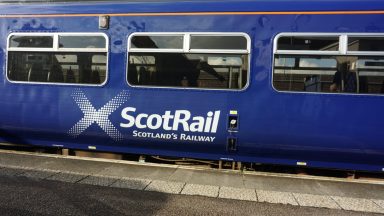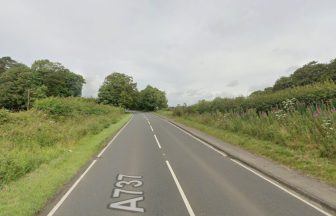A blind man travelling from Glasgow who fell onto the tracks at a train station is suing Network Rail and rail operating companies over the “traumatic” experience.
Abdul Eneser had been using a white cane when he fell from platform 14 at Manchester Piccadilly station on May 21, 2022, and claims that he was just a minute away from being hit by a high-speed freight train.
The 20-year-old said it was “the most traumatic experience” he has ever had to face as a visually impaired person.
He is now taking legal action, claiming that there was no tactile paving, which warns blind and visually impaired people that they are approaching changes in layout or hazards, on platform 14, unlike other platforms on the Manchester Piccadilly concourse.
He also claims that he was “failed” by Passenger Assist arrangements, which are designed to provide assistance for disabled people navigating stations during train journeys.
At the time of the incident, Mr Eneser had been travelling home from Glasgow to Manchester via Preston, and had booked Passenger Assist in advance.
He was helped to board his train at Glasgow, however due to delays, he missed his connection to Manchester from Preston and was forced to wait 90 minutes for the next Northern train.
Avanti staff helped Mr Eneser off and on the trains at Preston and he was told they would radio through to Piccadilly to tell them that he was on the train and his seat number.
However, when he arrived at Piccadilly platform 14, no one from Passenger Assist was present to help him because, he was later told, they had all gone home.
He said that he believes a signaller or the conductor assisted him off the train, but told him they couldn’t stay, so was left waiting alone on platform 14.
There were no audio announcements to tell blind and visually impaired passengers that there was no tactile paving on platform 14, unlike other platforms at Manchester Piccadilly where tactile paving had been installed.
As he tried to locate the steps from platform 14 to the main Piccadilly concourse, he stepped off the platform and fell onto the track.
The absence of tactile paving meant he was unaware of the platform edge.
Bleeding on both knees and in pain around his neck, he managed to stand up and lift his rucksack onto the platform.
The member of staff who had helped him earlier ran to Mr Eneser and helped pull him on to the platform.
His white stick and phone were still on the tracks when around a minute later, a freight train passed through.
The station manager gave Mr Eneser first-aid and he was told that Passenger Assist had gone home.
He went to A&E, but faced with a long wait, he went home and put ice on his wounds.
Network Rail told Mr Eneser that they were investigating the incident, but they have not contacted him since.
Represented by law firm Leigh Day, he has sent a letter to Network Rail, Avanti West Coast and Northern Trains to launch a legal claim about the Piccadilly incident and to remind them of their duties under equality laws, and the guidance on tactile paving and assisting disabled passengers, which he believes they have failed to observe.
Mr Eneser said: “I used to be a confident rail user, but the fear I experienced when I fell from the platform, and when I think about what might have happened if I hadn’t managed to get back on to the platform with a minute to spare, has left me very nervous when using the railway.
“Visually impaired people should feel just as safe as sighted people when they embark on a train journey. My experience shows that Network Rail and train operating companies are failing to provide a proper service for visually impaired people. I hope that when they stop to think about what might have happened to me on that night at Piccadilly train station they will realise they need to speed up their efforts to install tactile paving and improve their service urgently.”
In another incident on May 19, 2023, Mr Eneser again was travelling from Glasgow to Manchester and booked Passenger Assist.
He had to board a later train from Glasgow after his booked train was delayed.
There was no assistance available when he reached Warrington Bank Quay, where he was hoping to change for Manchester Victoria. Despite contacting the Avanti WhatsApp service, who assured Abdul they had spoken to both the train manager and the station staff, no one arrived to help him and he had to stay on the train.
He contacted the Avanti social media team who arranged for someone to meet Mr Eneser at Crewe.
However, again no one arrived, and since he did not want to travel to London, he got off the train. A member of the public guided him to the barrier, where he received guidance for his Manchester train.
Mr Eneser later discovered that the platform lacked tactile paving.
He added: “I have now faced Passenger Assistance failures and lack of tactile paving twice in one year. Had it not been for the member of the public helping me at Crewe, then I may have fallen from the platform edge again.”
Samantha Fothergill, senior legal adviser at RNIB said: “Up to 15% of people falling from platforms are blind or partially sighted. Despite being a fundamental safety measure which people with sight loss rely on to keep a safe distance from the platform edge, 40% of mainline railway stations in Britain lack tactile.
“This is completely unacceptable. RNIB has been campaigning for rail safety for a number of years and we’re pleased to see that Network Rail has now pledged to install tactile paving on all rail platforms in Britain by 2025. We will continue to monitor Network Rail’s progress until there are no train platforms without tactile paving in Britain. We don’t want another blind person to go through the same experience as Abdul.”
Leigh Day solicitor Kate Egerton, who represents Mr Eneser, said: “It is staggering that, despite the number of incidents involving blind and visually impaired people falling from platforms, tactile paving is missing from such a large proportion of stations. Network Rail and train operating companies have legal obligations to ensure that train stations are safe for all members of the public, including disabled passengers. These duties are plainly being breached.
“We hear from clients that Passenger Assist consistently fails leaving blind and visually impaired passengers to navigate train stations on their own. This is particularly dangerous where there is no tactile paving to alert them to the platform edge.”
Network Rail has been contacted for comment.
Follow STV News on WhatsApp
Scan the QR code on your mobile device for all the latest news from around the country


 Leigh Day
Leigh Day























